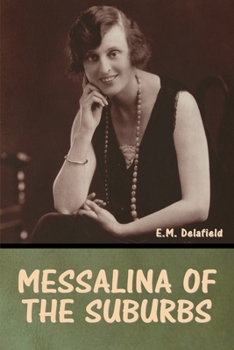Messalina of the suburbs
Select Format
Select Condition 
Book Overview
A fictionalized account of the Edith Thompson and Fred Bywaters case. Edith becomes Elsie, and Fred become Leslie. Edith/ Elsie was married to a much older man when she met Fred/Leslie and the two embark on a passionate affair. When Edith and her husband were walking home from and evening at the theatre, Fred confronted Percy Thompson and stabbed him. The two were charged with murder, and despite Fred insisting that Edith had nothing to do with it, and that it hadn't been planned, Edith was convicted of murder as well as Fred, the most damming evidence being letters that she had written to Fred saying she'd like to poison her husband or put crushed glass in his food. The case became one of the most talked about cases of the 1920's and it seems everyone had an opinion on it. Nearly one million people signed a petition against their death penalties. Several books, both fictional and non-fiction have been written about it, and this is one of the first. ... (Tania)
About the author:
Edm e Elizabeth Monica Dashwood, n e de la Pasture (9 June 1890 - 2 December 1943), commonly known as E. M. Delafield, was a prolific English author. She is best known for her largely autobiographical Diary of a Provincial Lady, which took the form of a journal of the life of an upper-middle class Englishwoman living mostly in a Devon village of the 1930s. In sequels, the Provincial Lady buys a flat in London, travels to America and attempts to find war-work during the Phoney War. Delafield's other works include an account of a visit to the Soviet Union, but this is not part of the Provincial Lady series, despite being reprinted with the title The Provincial Lady in Russia.
Delafield was born in Steyning, Sussex. She was the elder daughter of Count Henry Philip Ducarel de la Pasture, of Llandogo Priory, Monmouthshire, and Elizabeth Lydia Rosabelle, daughter of Edward William Bonham, who as Mrs Henry de la Pasture was also a well-known novelist. The pen name Delafield was a thin disguise suggested by her sister Yoe. After Count Henry died, her mother married Sir Hugh Clifford GCMG, who governed the colonies of the Gold Coast (1912-19), Nigeria (1919-25), Ceylon (1925-27) and the Malay States.
Delafield was a respected and highly prolific author in her day, but only the Provincial Lady series achieved wide commercial success. Her first novel Zella Sees Herself quickly went into a second impression and a first royalty cheque of 50.
Rachel Ferguson complained that she wrote too much and her work was uneven whilst considering The Way Things Are a "completely perfect novel" and suggesting (in 1939) that "her humour and super-sensitive observation should make of her one of the best and most significant writers we possess, a comforting and timeless writer whose comments will delight a hundred years hence." (wikipedia.org)





